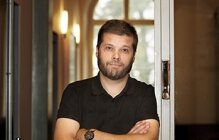Simo Vehmas Ph.D. – A Year as First Professor of Disability Studies in Finland
Mar, 11/11/2014 - Jue, 31/12/2015
In autumn 2013, Mr. Simo Vehmas, Ph.D. Education, was appointed as Finland’s first professor of Disability Studies. The five-year professorship for period 2013 – 2017 was established in the Faculty of Social Sciences at the University of Helsinki. It was supported financially by many Finnish disability organizations - among them Kynnys ry, founding partner of the incluD-ed network. "The Professorship of Disability Studies was like a dream come true, and I was very pleased to accept this appointment", says Simo Vehmas.
Mr. Simo Vehmas grew up and studied in Jyväskylä. He completed a degree as Master of Arts in 1994, and as Doctor of Philosophy in 2002, Special education as a major subject. In 2006, he was appointed as professor of Special education at the University of Jyväskylä. Vehmas began to study Special Education almost by chance. Disability as a phenomenon inspired him particularly, much more than his major subject. Especially he was interested in definitions of humanity and theoretical descriptions of disability.
Vehmas has focused mainly on philosophy of disability and dealt with issues such as the ontological formation, as well as the moral and political significance of disability. He has been the president of the Nordic Network on Disability Research (NNDR) since 2011. NNDR provides a forum for researchers, particularly from the Nordic countries. It organizes every two years an international research conference and publishes a scientific journal, the Scandinavian Journal of Disability Research.
Professor Vehmas is concerned that disabled people, like immigrants, are facing more discrimination and more negative attitudes, even violence. The atmosphere seems to become more narrow-minded and diversity is less well tolerated. This has been seen in the United Kingdom and now in Finland. "Disabled people’s barriers to participation are often the result of social organization and the attitudes of people on the other hand", Vehmas says.
He underlines that in principle all children should be able to go to school located nearest their home and no one should be segregated from the group. Barriers to inclusive education should be removed, even changing the legislation if necessary. However, we must think in a flexible way, because the general education system does not support enough all students. In some cases, arrangements like special small groups may be appropriate solutions for certain students.
In Finland, the educational and employment rate is considerably lower among disabled people than in other Western EU countries. In addition, many disabled people are working in sheltered employment. Even if they are doing proper work, it’s valued more like play or endless training. Employment is important not only for earning a livelihood, but also for social status and self-respect. Disabled people’s unemployment is higher than average and partly explains their marginal status. When the economic situation in the society is bad and so many are talking about cutting social benefits, disability studies can bring out that these cuts should not compromise the most vulnerable people's well-being.
"The target is better training for professionals. A broader understanding of disabled persons benefit not only themselves and their families, but at least lawyers, teachers, doctors and other health care professionals", he remarks. In Finland we have more than half a million people with disabilities, but disability has many indirect, wide affects to the society ."The better we understand the phenomena of disability, the better we can foster a variety of human well-being and social equality".
When comparing internationally, in Finland Disability Studies has been very limited, the leading countries in the world are the United Kingdom, the United States and Canada. Disability Studies was born in the 1970s, and in this field disability is examined as a social, cultural and a political phenomenon. Disability Studies differ from traditional medical or clinical perspectives where the main focus is on the identification of impairments and on the improvement of disabled people’s functional abilities.
The overall picture of disabled peoples’ employment, education, social security and independent living arrangements is still incomplete. Professor Vehmas’ assignment has been pioneering work. He wants especially to increase resources. He has been organizing teaching of disability studies at the University of Helsinki. The University has since this autumn provided Disability Studies Programme, as a minor subject. This study module helps students understand the variety of factors affecting the lives and well-being of disabled people. Some of the lectures are in English. By completing it module students get 25 credits.
His current mandate as a professor of disability studies does not provide much time for his own research. Vehmas is interested in improving disabled persons’ social status, in increasing education, employment and accessibility. The aim is more equal society. One broad theme he wants to deal with is good life "what good life means for disabled people and what the welfare society provides for them to reach it".
(Sources in Finnish: Professor Vehmas’ answers to some questions in 4th November 214; Interviews of Professor Vehmas in magazine Keskisuomalainen 13th October 2014 and in IT magazine 11-2013, published by The Finnish Association of People with Physical Disabilities; http://uutiset.helsinki.fi/2013/08/01/simo-vehmaksesta-suomen-ensimmaine...)

















